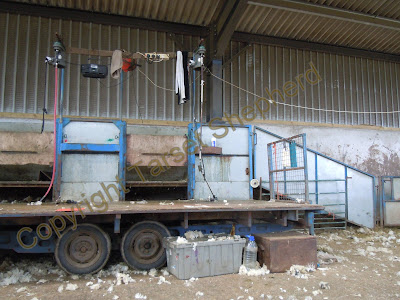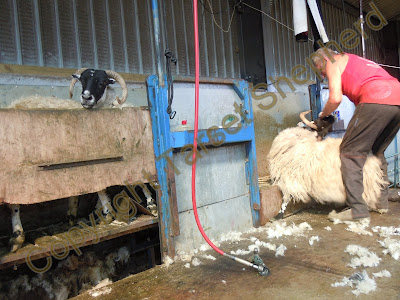Contract shearers usually have their own clipping trailers which they tow from farm to farm. These trailers come in many different shapes and forms. There is the pen type trailer, these are either fitted on wheels or can be built once in situ. They are quite simply a pen with one or two doors allowing access to the sheep. The doors will be on a spring hinge so they shut automatically once a sheep is removed, after all, the shearer will have their hands full with the sheep which they are dragging out. These pens sit on the floor, unlike the race type trailers which are generally up a height Many race type trailers follow the above design. A ramp which leads up to the race which the sheep are turned out of to be clipped. The sheep stand patiently (or not so) before being tipped out of the race to sit at the shearers feet and get shorn. Shep can sometimes struggle when helping someone else out on one of these trailers, it almost feels like you have to pat your head and rub your tummy (a thing I'm not the most adept at), I can hop from foot to foot trying to work out which foot to put onto the door to pull it down, whilst reaching for a sheep at the same time. Most are set up like this one with the sheep running to the left of the shearer, but there are some which run the opposite way and as I am easily confused it doesn't take much to have me trying to work out my left from my right!
Those of us who are naturally right handed find it easier to catch sheep left handed. The left hand being used to hold the head, turn it towards her shoulder and tip her over whilst the right hand is on her rump pushing it down. So getting onto a race which runs the opposite way finds those of us who are easily confused getting easily confused!! Regardless of any confusion eventually sheep will be sitting at your feet and getting clipped (shorn). These trailers need to sit level. The boards (area the sheep are clipped on) will often have found a spirit level used on them to ensure they are indeed level. It is far easier on your back if the area you are clipping on is indeed level, also far easier for handling the sheep. Clipping races are also used, Shep thinks these are the best approach, due in part to the fact sheep run along them far easier than they do when they have to run up a steep ramp and they are far easier to handle and catch sheep from than when they are standing in a bigger pen as in the first photo. This particular race is a permanent fixture on the farm. It takes up little room and is also used at scanning time to set the sheep into the scanning race. The doors open inwards into the race, enabling the shearer to pull a sheep backwards and onto it's arse at your feet without the next sheep in the queue escaping out of the open door. There are also mobile races, some made of metal, others of wood, the design is just the same, sheep running along the level and being taken out of doors along the side of the race. It is of little consequence to the shearers that the clipping trailers can be difficult to load when sheep have to run up a steep ramp but for the staff on the day most appreciate having one of these races which run on the level which sheep trot along quite easily.
Anyhow, we're nearly into August and still the clipping season is running on. It's that wet stuff which is to blame, but hey! we'll all get there eventually - always have in the past.
The contract shearers have been battling along, many sheep are yet to clip in the countryside and some long and heavy days have been put in when weather has allowed. Shep was just talking to some shearers the other day, one a lad who started his shearing career alongside myself, he finally left me standing and went on to join the 300 a day club. We were discussing the season and I admitted to being somewhat sickened off with it this year, feeling it was extremely hard work. What a relief to find someone else shared my views. This lad explained that he just couldn't get into the swing of things, too many days off, too many days you started late and finished even later, too many days jamming in many sheep to try and get through the backlog.
Now it is fair to say that I thought it was just my personal circumstances, age probably too but we have both concluded that it is just the season. After all, when clipping all day every day the body soon gets accustomed and fittened and toned up. Here we are this season clipping one day and having two or three off, the body doesn't get a chance to get into the swing of things, it always feels stiff and uncooperative - and not just my body by all accounts.This particular shearer told me that he only clipped for 10 days in June, 10 days out of 30 - there is no way the body is going to get accustomed to what it is meant to be doing, or the head for that matter. Not to worry though, it is getting through, there are less and less woolly sheep in the countryside than there were a few weeks back.
Homepage >Blog
Monday 30 July 2012
Sunday 15 July 2012
Clipping (shearing) season 2012
Just incase some of you aren't aware it has been somewhat unseasonal this summer, yes, I know we live on an island which throws a variety of weather our way but........... not rain ALL the time. It would seem it has become a permanent feature, that wet stuff in what ever form it fancies. There has been wet, piss wet, very wet, wetter than wet then the wets we daren't mention in case children are listening, sometimes there has been the not so wets or even just the damp wetness. It is quite safe to say though that in a 24 hour period there has indeed been some form of wetness. Unless that is you live in the Western Isles of Scotland, now those poor souls are suffering a drought and yet they live in an area I always believed was a wet one - nowt like the idiosyncrasies of the good ol' British weather is there?
All this wetness has been causing grief, those that work outdoors, tend to stock are sick to the back teeth of wearing wellies and waterproofs day in day out. Stock are also getting sick of being wet all the time. The grass is growing BUT it also needs harvesting, again a problem when ground is waterlogged. Sheep need clipping, their coats need removing, a job which is preferable to do when the fleece is dry, packing it into wool sheets when wet will encourage it to mould and the price received for the product will be less should the product be damaged. The good news is sheep have been queuing up Blackies and Cheviots have been waiting patiently for their annual haircut. Probably held in fields for longer than usual waiting for a break in the weather to allow them to be housed dry or dryish. Patience pays off and clipping commences.
It has to be said that the season has been a slow one, desperation has lead to sheep being clipped wet, many have been clipped damp and there are many, many more still waiting to get clipped. Here we are in the middle of July and Shep is 1,000 sheep behind on last year, they're still out there, they are still carrying their full fleeces, it just hasn't been possible to attend to their needs yet. Organisation has gone out of the window this year, whoever gets sheep housed first seems to be the ones who get their sheep shorn. Quite arty I think - 'washing lines' full of fleeces, that's the way forward, dry the wool off the sheeps back! Unfortunately a great deal of room is needed to hang a few fleeces up and some fleeces such as those off a cheviot or texel tend not to hold their shape like these fleeces off a blackie and are not suitable for hanging off a line, they just fall to pieces which is a tad inconvenient of them on a year such as this. Shep is mightly relieved that she doesn't clip the number of sheep she used to do, planning and organisation is a nightmare as it is with out the added complication of a good few thousand to clip. But regardless, we are getting there, it may be a long shearing season but they will all get done eventually.
All this wetness has been causing grief, those that work outdoors, tend to stock are sick to the back teeth of wearing wellies and waterproofs day in day out. Stock are also getting sick of being wet all the time. The grass is growing BUT it also needs harvesting, again a problem when ground is waterlogged. Sheep need clipping, their coats need removing, a job which is preferable to do when the fleece is dry, packing it into wool sheets when wet will encourage it to mould and the price received for the product will be less should the product be damaged. The good news is sheep have been queuing up Blackies and Cheviots have been waiting patiently for their annual haircut. Probably held in fields for longer than usual waiting for a break in the weather to allow them to be housed dry or dryish. Patience pays off and clipping commences.
It has to be said that the season has been a slow one, desperation has lead to sheep being clipped wet, many have been clipped damp and there are many, many more still waiting to get clipped. Here we are in the middle of July and Shep is 1,000 sheep behind on last year, they're still out there, they are still carrying their full fleeces, it just hasn't been possible to attend to their needs yet. Organisation has gone out of the window this year, whoever gets sheep housed first seems to be the ones who get their sheep shorn. Quite arty I think - 'washing lines' full of fleeces, that's the way forward, dry the wool off the sheeps back! Unfortunately a great deal of room is needed to hang a few fleeces up and some fleeces such as those off a cheviot or texel tend not to hold their shape like these fleeces off a blackie and are not suitable for hanging off a line, they just fall to pieces which is a tad inconvenient of them on a year such as this. Shep is mightly relieved that she doesn't clip the number of sheep she used to do, planning and organisation is a nightmare as it is with out the added complication of a good few thousand to clip. But regardless, we are getting there, it may be a long shearing season but they will all get done eventually.
Labels:
blackfaced sheep,
cheviots,
clipping,
hand shearing,
hill shepherding,
sheep,
weather,
wool
Subscribe to:
Posts (Atom)
About Me

- Tarset Shepherd
- Tarset, Northumberland
- A peculiar individual by my own admission. One who has been compared (character wise) with a cheviot ewe!
Recommended Reading
- Woolshed1 blog
An insight into the agricultural heritage of Northumberland and farming in New Zealand, by Dr Clive Dalton - Shepherds Delight blog
Shepherding in the Scottish Western Isles - Dafad's-Days blog
Itinerant observer and thinker











